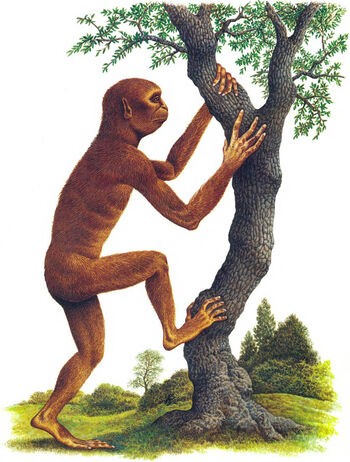
The temperate woodland-dwellers, Homo virgultis fabricatus, (also known as temperate forest-dwellers, woodland-dwellers or ground-dwellers) is a quadrupedal, highly adaptable, Australopithecus-like human from 500 years (the 25th Century), engineered from Andlas, that takes niches left behind in temperate environments, from Man After Man: An Anthropology of the Future. Their limbs are ideal for climbing trees.
A human engineered to survive and flourish in a temperate forest without the backup of civilization would need to be omnivorous. Forests are less abundant than tropical jungle. To reach the full range of foodstuffs available, the temperate woodland-dweller has to be extremely nimble, and be able to live both at ground level in the undergrowth and high in the treetops. Arms and legs are of similar length and long, but agile, climbing fingers increase its range. A covering of fine hair keeps the woodland-dweller warm in the temperate conditions.
This is the one that is going to cause the problems, Carahudru the Hitek sees that. It has few adaptations, but looks little like its ancestral Andla. It is covered by a fine furry pelt, so that it need never manufacture clothing. The arms are longer, the fingers are more delicate, and the teeth are stronger. What is more the feet are prehensile, with the big toe developed into a thumb to help the creature to climb trees. Deprived of the support of the big toe, it can no longer stand upright, and its position at rest is a four-footed crouch. It is like a nonhuman animal, but
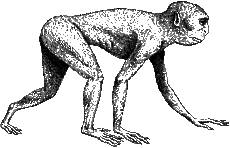
Long prehensile toes and fingers can grip rough bark. Lack of a supporting big toe means that the temperate woodland-dweller walks crouched but climbs with ease. It is the least specialized, and therefore, most adaptable of the engineered species.
there is no avoiding that. The traditional human frame is totally unsuited for anything but a cultured civilization, so if mankind must live from the fruits of nature without resorting to culture and civilization it is going to have to abandon any traditional view of beauty and elegance. It is going to have to return to the beast.
It is inside the head, however, in the brain, where the most fundamental difference of this creature lies.
What makes a human being? That is the solid residue to which the argument condenses. Are we, the Hitek, more human than the Andlas because we make greater use of technology, and they just live in the wild and grow their own food? Are the Andlas more human because they are healthier and look more like our ancestors? If the latter is the case then we could argue that the more primitive the being is then the more human it is.
In that event the specimen before him must be the most human of all. Long arms and prehensile feet will allow it to live both in the deciduous forest trees and on the ground. There is a lack of specialization in the shape, simply because there are so many different food supplies in a deciduous forest that it would not be practical to adapt this creature to exploit any one in p
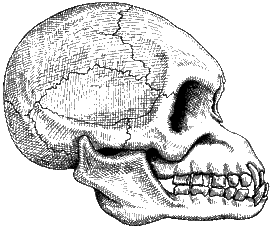
The omnivorous diet is reflected in the dentition, with heavy crushing back teeth for nuts, and delicate front teeth for catching insects. Its diet is close to that of early great apes; as is its evolutionary potential.
articular. However, all this food is not necessarily palatable. Many plant-produced substances are poisonous to the human metabolism, and diseases may abound that have not been anticipated. The engineers have done their best and built in systems that could combat most of the known natural poisons, so whatever has been overlooked will have to be regarded as part of natural selection. As a result, they have engineered a generalized hunter-grazer-browser-insectivorous scavenger.
They also engineered it with low intelligence. If it is to be surrounded by food, the argument went, then it will only need enough intelligence to allow it to find it. An intelligent creature may cause trouble, may feel resentment at being experimented upon, envy at not being able to live in the cities, rebellion against those that engineered it. What is more it may try to better itself, and build its own civilization (and civilization does not now seem to mean a long-lasting and successful species).
In the back of Carahudru's mind is a lurking misgiving. Throughout evolutionary time, the unspecialized creatures proved to be the most adaptable. The new world that is being engineered now is supposed to be balanced, with an engineered creature installed in each environment. If one in particular evolves to encroach on another's environment, what will the long-term result be? It may even be that intelligence will re-evolve by itself.
That is for the future, though. Carahudru throws open the door and his creature steps gingerly out into the bracken and brambles of the deciduous woodland. Immediately it feels at home. Into the thicket it runs, having totally forgotten Carahudru in the flying vessel. Carahudru catches a last glimpse of the sunlight casting a dappled pattern on its back before it disappears into the warm greenery.
By 1,000 years (the 30th Century)[]
The advantage of living in a temperate deciduous forest is that there are so many different things to eat at different times of the year. In the spring there are delicate shoots and soft buds; in the summer, the trees and bushes are full of leaves; and autumn is the time of fruits. It is winter that gives the problems. With any luck a temperate forest-dweller has eaten so much throughout the rest of the year that it has built up enough fat to enable it to exist through the lean months, or it may be sensible enough to gather food such as nuts during the autumn and store them away for winter.
Throughout the year, too, there are insects, their grubs and other smaller animals hiding under stones and beneath the bark of trees.
The temperate forest-dwellers were designed as omnivores, in order to take advantage of all these circumstances.
Hoot is typical. He looks very much like his great-great-great-great (great to the power 20) grandfather, who was one of the first genetically-viable temperate forest-dwellers to be engineered. He is built as a climbing creature, with long arms and legs, but he is just as comfortable on the ground. His teeth are quite generalized, able to cope with a wide range of foods from soft fruits to hard insects. His main senses consist of sight, smell, taste and hearing.
In fact, in outward appearance he resembles the ancestral human being. Inside his long body, however, his digestive system contains special organs for treating particularly tough food, and self-sustaining colonies of specialized bacteria that can break down tough silica and cellulose, allowing him to digest just about anything that he swallows.
His mind, though, is dull. That was part of the plan as well, as it had been believed that such a creature would survive better without the typical human power of logic and reasoning. Its food was all around it, so it would not need to experiment, to try to make its life more efficient, since its environment would sustain it perfectly adequately. The prototype worked so well that many others were engineered, and now there are self-sustaining colonies throughout the temperate forests of the Northern Hemisphere.
Nevertheless, Hoot now finds something new in his forest. On top of the hill, close to his own trees, there has always been an array of glistening things, like the leaves of a tree, but bigger and square. Hoot has always known that something big exists deep within the hill, connected to these strange things. A minor sense that came to the surface when his ancestor's furry pelt was engineered was sensitivity to electrical fields: a tingling of his hair roots tells him when he is in the presence of electrical machinery. He understands none of this, of course, but he knows that this sense tells him that something important lies beneath the hill; and this something big is important to the lumpy creatures that he has always thought of as some kind of distant relation to his own people.
An unfamiliar noise and increased electrical disturbance has brought him to the hill this morning. Flying things came in from all round the sky and descended, disgorging more lumpies than there are woodlice in his tree. Sometimes when his own people are angry with one another (say, if he wants to mate with the same female as somebody else) he can sense the tension in the air. Anger and hatred are obvious and can be communicated without noise, and it is the same here. Hundreds of lumpies have collected together and they are angry. They want to get into the hill, and are pushing at the door.
Eventually they break through, and other lumpies come out and tackle them. Hoot has never seen such a fight, dozens of lumpies tearing away at one another, pulling each other apart, stamping each other into the ground. His own people do not do things like that.
Eventually the battle moves on, into the hill. The noise and the chaos retreat underground, leaving the soil littered with dead.
Stealthily, Hoot descends from his tree and scampers over to the site. The first dead lumpy is still warm, and oozing blood. He sniffs all around the corpse, using his selective sense of smell to ignore the main odors and concentrate on the smells that seem most interesting. He lowers his mouth to the seeping wound and, experimentally, licks the blood. It is good. He licks some more, using his tongue as an organ of touch, to find the parts that may be palatable. Then he starts drinking.
His digestive system was designed to absorb almost anything. This is as big a feast as he has seen in many a day, and the others of his kind should have a part of it.
Rearing up to his full height, he lets fly his own recognition yodel, summoning all of his brethren who are within earshot. It looks as if this is going to be an easier winter than last.
As he hears the crashing and scampering of his relatives approaching through the leaves and undergrowth he turns back to his feast. With a feeling of contentment he sinks his teeth into the synthetic flesh and artificial organs of the creature before him.
By 2,000 years (the 40th Century)[]
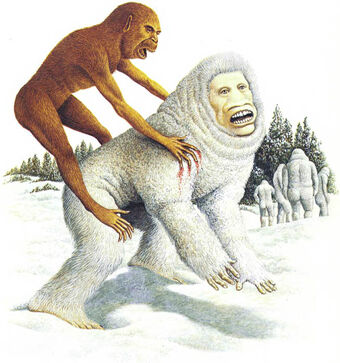
The five engineered forms do not perceive each other as descendants of the same ancestor. When different types meet, they do so as competitors and enemies; or else ignore one another as irrelevant.
Still it becomes colder. This is obvious even to a being of such dim perception as Rumm. His favorite hollow has not yet cleared of snow, and already the Sun has passed its high point. From now on, for the rest of the year, the days will become shorter and the air colder. Therefore the snow will not melt at all.
It is going to be far more difficult to find food. Although his intellect is basic, his senses are acute enough when food needs to be located.
His mate and his children are safe from the cold in their hollow-tree den, but they will soon be hungry. They may need to move away, to follow the Sun like all the others in the area have done. Rumm has always resisted that because his instincts told him that if everybody else moves away all remaining food will be left for himself and his family. So far this philosophy has worked. The gathering of food has become more and more difficult, but there has been enough to keep them alive. Now he is not so sure. If the snow does not melt, then little will grow during the rest of the year.
He gathers the twigs and branches of the scrubby bushes rising above the snowy ground cover. With a prickly armful he turns back towards his den. The leaves will be bitter and tough, but at least they will be edible.
He surmounts a ridge, and glimpses a group of people below him.
Fast as a blink, he drops his branches and falls to the ground, off the skyline. What are people doing here? Everybody in the area has moved away, following the Sun.
Stealthily he moves back up the slope and peers cautiously over the top. They are people, all right, but quite unlike any people he has ever seen. Their bodies are padded out with fat, and their hair is dense and curly. There are thick rolls of flesh around their necks and wrists, and their faces are broad, with enormous nostrils but tiny eyes. There are about ten of them and they are moving towards the Sun.
It is as if these creatures have come from an even colder place, and they are following the sunshine, just as Rumm's people have done.
Are they really people? They have a body, two arms, two legs, just like Rumm, but apart from that they are quite different, with their furs and their fatty rolls. They are also from a different place, so they cannot be people, like him.
They must, then, be animals.
Food!
The coarse leaves and twigs forgotten, Rumm waits until the group has crossed the open ground and moved into the wispy trees. Then he scampers down the slope towards their track, taking advantage of any cover that lies in the way. Their smudgy footprints in the snow make their trail easy to follow. Silently, as he does when he is stalking birds, he creeps up on the rear of the party, waiting for stragglers. There are none. They are moving as a tight compact group.
After a while the party comes across the stream that runs through the valley, tinkling along coldly between transparent shelves of ice. They pay it no heed, but move onwards, except for one youngster. Unnoticed by its group, it goes down onto its knees by the chilly water, scoops some up in its broad palm and begins to drink. The remainder of the group presses onwards.
This is Rumm's chance. Silently he pounces upon its back and the youngster stiffens beneath him and gives out a single, high-pitched plaintive yell, like one of his own babies crying.
That yell almost stops the attack, so human is it; but he presses home his advantage. Throwing his hand over the creature's broad nose and mouth, stifling the unnerving noise, he wrenches its head backwards, into the folds of its neck. A cracking noise tells Rumm that the move has been satisfactorily fatal, and the body goes limp.
The yell has alerted the rest of the group, who turn back and with cries of anger descend upon Rumm and his victim. It is too late, though. The temperate forest-dweller has hoisted the dead creature onto his shoulder and disappeared into the snowy thickets. As he goes, he hears the noises of anger behind him, and hears them change into wails of anguish and loss.
What has he done? Creatures that can feel loss so acutely, and can make such sounds of despair - surely they must be people after all? The wailing fades and disappears behind him, but it will remain long in his memory. It will come back to him in quiet moments, or when he is concentrating on something else; and for many a day he will feel sorrow and sympathy with these strange beings. What has he done?
He has fed his family, that is what he has done. With a more confident stride he makes his way with his prize back to his mate and his children in their hollow-tree den. They will see the winter through all right now.
Larn the plains-dweller strides across the grassy plains at the head of his tribe. Not far off he sees a thicket of bushes and thorn trees that he does not trust. Another group of plains-dwellers met danger at such a clump not long ago when a pack of some new kind of animal burst from within, taking them by surprise, and killing three of their number before the rest could escape.
Larn had thought about this incident for some time, and it made him uneasy. He had noticed that the other animals, the little animals of the grassy plains, had their enemies. There was always strife and death in the undergrowth, but not for the plains-dwellers. He had always assumed that this was because the plains-dwellers were the largest creatures around. They had no enemies. The plains were theirs, and theirs alone.
As a result the populations of plains-dwellers are growing and growing. As a lad, Larn could remember travelling with his tribe for days on end, and not meeting any others. Now other tribes are seen daily, and each one seems to be becoming bigger and bigger.
In one part of his mind Larn feels pride at this; his people are the masters of this landscape, and they should spread and fill it. Another, quieter part of him rebels, however. If there are more and more plains-dwellers as time goes by, will there always be enough grass to feed them all?
He turns and looks back at this tribe, and counts them: ten females, all his mates; five young males, that have latched on from other tribes; six of his children, almost adult; twelve of his juvenile children; and two old females, members of the original tribes of two of his mates. He took responsibility for these when he chose the females from those tribes.
It was the two old females that kept the tribe moving slowly. They all had the long legs with muscular thighs and tapering feet that allowed them to run quickly. However, they rarely had the chance to do so. Sure enough the youngsters would run about, very actively, but the older members had to remain close to one another, and so moved at a slow and sedate pace. It was so long since Larn had run that he thought he might have forgotten how (not that there was any real need for speed).
The children enjoy it, though, he muses as he watches them scamper and gambol through the long yellow grasses of the open plain.
Suddenly there is a hideous howling and baying noise from the suspicious thicket. He had let his mind wander and had forgotten the danger that the other tribe had faced.
With a yelled warning he brings the whole tribe together, but the youngsters are scattered too far. A crashing noise issues from the thicket and about ten indistinct forms burst out and streak through the grass. One of his children is brought down with a crash and a flurry of dust and broken plant stems.
Without thinking, for the moment, of his loss and grief he runs about, rounding up the others, trying to get them to crowd together, instinctively knowing that a large group is stronger.
He is dimly aware that the others are doing their best as well. The young males have rushed together in defense of the younger females and the juveniles. They stand shoulder to shoulder while the others sprint into the distance.
Then he comes across a horrible sight. One of the old females lies dead, her throat torn. Over her stands a hideous and misshapen, yet strangely familiar, figure. It is almost like a plains-dweller, but it does not have the long legs, its belly is not so round and its teeth are not so massive. These must be the strange new creatures that have moved onto the plains.
It is staring at him, the female's blood dribbling down its chin. Its eyes are grey and steady, it bares its teeth, and then it pounces. As a reflex, Larn brings down the cutting edge of his left hand, thrusting it into the soft flesh of the creature's neck, killing it instantly. So they are not invulnerable, Larn thinks with triumph; we can kill them.
Then another dark shape crashes into his back, sinking its teeth into his neck, and as he falls into the dust he realizes his mistake. He should have run, like the young females. These creatures have cunning and hunting skill, but they do not have speed.
If plains-dwellers are to continue to be the masters of the plains, they must learn to keep clear of these monsters. Speed is going to be their saving, but it is too late for him.
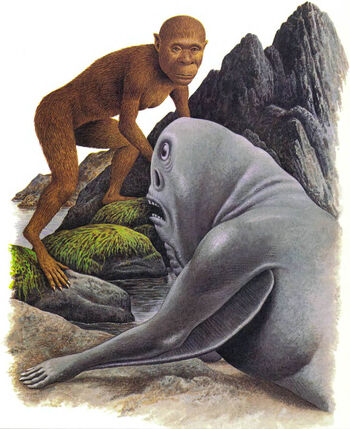
Even with long toes and fine balance, the temperate woodland-dweller has to move carefully across the slippery rocks. Curiosity proves stronger than its fear of falling.
The tide seems to be going out further these days. Coom is only a young lad, but he is sure that he can remember when the water came right up to the cliffs. Yes, sure enough, there is still a line of whitened tree trunks and bleached sticks, the remains of debris brought up by the waves long ago. His father is much older than he is, and can probably remember when the sea came right up to the foot of the cliff all the time. He might even remember it washing to the top of those austere stone faces.
Now the water is well out, leaving pools and puddles amongst the slippery, seaweed-covered rock. It will return, before the day is out, but it will not come anywhere near the cliffs. Coom thinks that it probably never will again.
He drops to all fours by the nearest of the rock-pools. The empty woven-reed bag flops onto the cold rocks beside him. Nothing much in the water here. Further down, towards the edge of the sea, the pools will be more alive.
Here he has to be careful. The rocks are wet, seaweed-coated and slippery; and they are very cold beneath his feet. Now the cracks in the rocks are full of winkles, limpets lie flat and immobile against the wet algae-clad stone, and crabs scuttle and hide in the clear waters of the pools. With his long fingers, Coom pulls the shelly creatures away from their rocks, and dips into the cold waters for the crabs and sea anemones. It is meager fare, and even when his bag is full it will not give very much nourishment to this family.
He straightens up and looks back towards the cliff. There, in one of the caves along the foot, live his parents and his three brothers and sisters. It is a good thing, he thinks, that the sea does not come up to the cliffs any more. He and his family would be washed away.
He is far enough down the beach now to see the mountains rising beyond the cliff. They are white, and have been for some time. He can remember, when he was very, very little, that sometimes they were green and purple. It is snow and ice that covers them, he knows that. Even the rocks and the cliff are covered in snow and ice now and again. Then a sudden thought strikes him (snow and ice are made of water, so could it be that, with so much more snow and ice over the land, the water has been taken from the sea) and that is why the sea does not come up to the cliff anymore?
A loud splash from behind him breaks his train of thought. Something big trapped in a pool! He turns quickly. At first he thinks it is a fish, but he has never seen a fish as big as that. Then he thinks it is one of his family who having slipped in is finding it difficult to get out, but no. It is neither of these.
It seems to be something in between.
The creature rises halfway out of the water. It has a face like his, with eyes, a nose and a mouth; but the eyes are enormous, the nose a pair of slits, and the mouth a vast downturned feature between huge fleshy lips. It has arms and hands, but the rest of the body is indistinct in the water. It seems to be smooth and shining.
Coom stares at the apparition, and it stares back at him. The great mouth begins to work, and sounds come out. It is trying to say something.
Is it dangerous? No, Coom does not think so; in a strange way it is almost like himself. He says a few words back to it, one or two of the few words that he and his family use, but that is no good. Whatever it is does not understand. Instead Coom tentatively reaches out his hand; the odd creature reaches out its own hand, and the two touch.
A friend! Coom has found a friend outside his family.
He lets drop the strange slippery hand, and turns to run back to the cave to tell everybody, full of joy and surprise at his discovery. His father is there, at the entrance, cracking open and scooping out a shellfish that the others of the family have brought him. Coom goes running up to him, grunting out his news. His father is all attention, as are his older brothers.
The result is unexpected. Coom is snarled at to move out of the way, then thrust into the cave while the others run off down the beach towards the sea.
That is not right, thinks Coom, that is not how it should have happened. They do not seem at all pleased about the new friend. He is not going to stay in the cave while all this is happening, so he runs down the rocks after them; but he is too late.
Already his father and his brothers are throwing rocks and bleached sticks at his new friend, and shouting the most hideous threats.
The strange creature, in panic, has pulled itself out of its rock-pool, and is wriggling its way across the clammy seaweed and cold rocks towards the waves in blind terror, bleating out strange sounds as it goes. Coom stops. He does not want to be any closer, and see in more detail. He can imagine the weals and bruises on the glossy body, the blood from the fresh cuts, the look of anguish and pain on the outlandish face. He can only hope that the strange being reaches the water before his father and his brothers.
With sadness he watches it slip into the waves, beyond the gesturing figures of his family. A flip of the finlike tail and it is gone.
Well, his father must be always right. Coom considers the matter. He must have done wrong to try to befriend it in the first place. It is obvious that his people, the people of the land and the creatures of the sea will never be anything but enemies.
They are not going to be able to stay much longer. Old Yerok knows that the tribe is finished in this area. They will move on somewhere else, probably to a place owned by another tribe, and where the Tool is of no use at all.
He looks down at the clay model inside his shelter. It has taken him all his life to build, and now that life is almost finished it is becoming useless as well. The boxes, holes and chambers are an accurate reproduction of what has been found beneath the gravel and sand across the plain, but soon the whole thing (original and model) will be engulfed.
Every year the waters change. The rivers flow out of the ice wall and wash across the plain to the distant sea, splitting, crossing one another and rejoining, amongst the shifting pattern of gravel banks, sandbars and claypans. They change their courses continually. This has always happened; the tribe is accustomed to it. Now, however, the ice wall is creeping out so far it is spreading over the plain itself.
Beneath the gravel, the sand and the clay, lies the Mystery. It was built by people a long time ago, and it was built to live in. Yerok can tell that by the pictures that he has found in it. Then it was destroyed by the sea, which he can tell by the layers of sand and mud that fill the rooms, chambers and passages, and the old seashells that cluster on the crumbling walls and the red powdery metalwork. Other people lived there afterwards, once the sea had retreated again, probably digging into it like his own tribe does. He can tell this by the skeletons piled in the mud layers above, that have to be shifted every time they dig downwards with the Tool.
The skeletons are of people, but of people quite unlike those of his tribe. His own people have longer arms and longer fingers and toes, as though they were designed to climb on things (rocks or even trees). Their teeth are bigger, as though they were meant to chew harder foods. Yerok feels a great sympathy with these old people, guessing that when he is dead, and that occurrence is not too far away, his skeleton will be found to be more like that of one of these ancient people than that of one of his own tribe.
He has known that for years, but of course nobody else noticed. He was born different, as if he were actually the son of a very distant ancestor, but one who had lain dormant, generation after generation, and only reappeared with Yerok's birth. His resulting greater intellect soon made him the leader of the tribe, and he led them into peaceful and plentiful times. It is his one great sadness that his children do not take after him: they are all the same long-armed, long-fingered, dull-witted, instinctively-acting creatures as their mothers.
He has always known there were riches to be found in the old dwelling places buried beneath the gravels of the plain. He built the Tool, and used it to dig into the sediments to find them. Now all the tribes within marching distance have drinking bowls, clothing and footwear, extracted from this plain by his tribe and traded for food.
Soon all that will be finished. The ice has been encroaching on the plain for as long as he can remember. In the gloom of his shelter he leans on his digging Tool and looks down at the meticulously-crafted clay model of the layout of the ancient dwellings (the model he uses to determine which part of the area the tribe should dig in next). Some of the places are gone already; those to one side have now been buried by the ice. The ice surge this coming winter will probably cover and obliterate the Mystery forever.
Not only that, but the tribe is drifting apart. His two eldest sons, Hrut and Gultha, detest one another, both wanting to lead the tribe once he has gone. No amount of training will persuade them that it will be in the interest of all if they compromise. His death will be a sad blow for the tribe, and for all the other tribes in the area that benefited from the trading.
His death comes so suddenly that he has no time to recognize its approach. Hrut, silently behind him, brings down a rounded boulder from the gravel banks upon his head, and instantly obliterates the one force that has lifted the tribe out of the surrounding savagery. The body that once held the last spark of civilization, a throwback to a sophistication that once was, falls limply into the clayplan of the ancient city, crushing the delicate walls and collapsing the whole intricate network.
With a cry of triumph Hrut grabs up the Tool. With this symbol he is now the master.
A shadow appears in the doorway of the shelter. It is Hrut's brother Gultha. Despite the slowness of his mind he sees instantly what has happened, and growls out a challenge. Hrut swings up the Tool in a wide arc, catching Gultha across the face and neck, and sending him staggering backwards to collapse bleeding on the gravel. He leaps out into the chill blue daylight and chops downwards with the Tool, until he is sure that Gultha is dead.
Then he stops to catch his breath. He is truly the leader now. He shakes the bloodstained trophy in the air in triumph - he has discovered the true function of the Tool.
By 5,000 years (the 70th Century)[]
He will be known as Trancer. He really has no name, since neither he nor his people have sophisticated speech, and so cannot think of themselves or of each other in terms of words. They have, however, a deep commitment and affection for members of their own group. Cooperation is necessary in the bleak midlatitude tundra and coniferous forest where they live. To the north lie the snows and glaciers of the vast icecap; to the south, beyond the narrow belt of conifers, lies the vast sweep of cold steppe. There may be more habitable places beyond the chill grasslands, but they are too far away to contemplate.
The gnawing cold of winter is reaching downwards again, and the store of food that they have gathered this year is not very big. It will be difficult to feed all 20 of the group all through the winter, and impossible if they are raided by others.
Trancer is weary of fighting. Half of the food store in the shelter was gained by stealing from the other groups of the forest. This should not be. There should be plenty of food for everybody, and if there is not it should be shared equally. Certainly Trancer would be willing to share the mound of seed cones that he is now carrying back to the shelter.
His weariness is temporarily overcome by a vague sense of achievement, as he is now carrying more cones than he has ever been able to before. He found the sloughed bark of a dying tree, and he kept piling cones onto it until it could hold no more. Then he carefully lifted it from the ground, and is now carrying the find, and the food, back to the shelter. If he had been using a thing like this all summer the whole group would have been able to gather much more food.
He breasts the edge of the narrow gully where the shelter is built, and begins to descend the slope carefully. Between the straight trunks of the trees the soil is loose (a yellow fragrant crust of decaying needle leaves and a rich black soil beneath). The shelter is a tightly-woven hood of sticks and branches, covered with a cozy layer of soil and needles. It is built halfway up the slope that faces the Sun, so that it will be warmed by the earliest rays of next season, and yet is far enough above the floor of the gully to avoid the bitter frosts of the hollows. These hints for survival have been passed on by example from one generation to another.
Strong smells of crushed needles stop Trancer in his tracks. There is something wrong! He drops his load of cones and finds the shelter of an isolated bramble bush. Dimly, far along the slope, he can see a dozen figures heading silently towards the shelter. They are not his own people. It can only be a raiding party.
Trancer leaps from cover and runs down the cascading stream of soil and needles towards the shelter. He shouts to break up the raiders' stealth, causing the surprised faces of his group to appear at the entrance. Then, at the edge of his vision, he sees that the approaching party has abandoned its silence and burst out into a full force attack.
The other males of his group rush out of the entrance to defend the shelter, and Trancer turns to join them. Then he sees that the raiders are much more numerous than he had thought, and realizes that his little group is not going to stand much of a chance.
Wearily he steps back from the frontline. He is not going to fight. He has had enough. He retreats into a corner of the shelter, closes his eyes tightly and curls himself up into a compact ball. With all his mind he wishes that this were over, that all the fighting were done and that the raiders had gone away. He wishes. He wishes!
He opens his eyes to a dark silence. Nothing is moving anywhere, and there is the unmistakable stench of death about him. His head aches, he is cold and, as he stretches from his cramped position, he finds himself to be unbelievably stiff. What has happened?
Slowly he crawls to the jagged shape of lightness that is the entrance to the shelter. Day is just dawning. He must have been asleep! In the midst of a battle! This could not have been an ordinary slumber.
As the sky lightens, he is able to take in what he sees about him. The raiders have left his tribe all dead; the bodies of his family are scattered limply around. They must have ignored him, thinking him dead as well. He does not look at the food store. He knows that it will have gone. He cannot possibly survive the winter now.
Then he looks closer at the bodies of his family. The spilled blood is dried to blackness, the faces are blue and sunken, the eyes have been taken by birds. These people have been dead for days!
He has been asleep for days! How can this be?
For the next few days and nights he can think of nothing else. His last recollection of the battle was of himself curling in a corner and wishing that it were all past. Now suddenly it is all past, as if he had wished himself into a temporary death to avoid danger.
If he can do that to avoid permanent death in a battle, could he also do it to avoid death by cold and starvation through a harsh winter?
It is worth a try. Best thing is to eat as much food as he can now - presumably his body will still need it while he is "asleep", even though it will use it more slowly. Then he will have to find a comfortable sheltered place and wish that winter were all over.
He hopes that it will be as easy as that. It is his only chance of seeing the winter through until the warm growing times return.
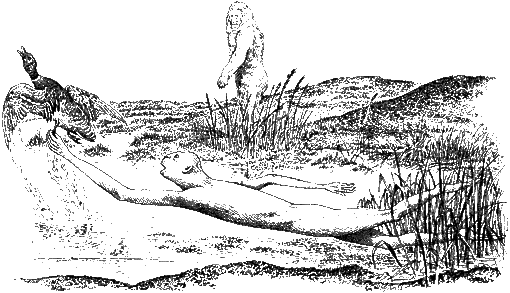
A few of the swiftest woodland-dwellers have adapted to life in the tundra.
This one will be referred to as Snatch. In shape, he is much like the generalized dim-witted temperate forest-dwellers generated in the laboratories of the now extinct genetic engineers 3,000 years ago. He has the long body with the complex digestive system that allows him to eat almost anything, from leaves to grubs. His arms and fingers are long and nimble, but his legs are quite short - they were meant for pushing through thicket and undergrowth and for climbing the thick trunks of the deciduous trees, not for striding across the wobbly peat bogs and sharp grasses of the open tundra. Nevertheless the quickness of his actions has enabled him, and a few like him, to live on in his original area despite the fact that the landscape has changed from mixed woodland, through coniferous forest, to chill tundra bleakness in a few thousand years. Now an icecap sparkles on the northern horizon, where there was once the luxuriant green of forest in the time of his great-great-great-grandfather. The standing waters of the peat bogs attract huge flocks of ducks and other birds for most of the year, and Snatch has become adept at catching these. By floating variously-shaped bits of wood on the surface of a pond he can entice the birds to land there. Then, when they are settled, he darts out of the concealing reed beds and grabs one before it can fly off.
This time the weather has caught him out. The water of the lake is too cold for a long-term immersion, and the birds have not been coming. The Sun is going down and the sky is about to turn to the misty purple he usually sees when he is almost back amongst his tribe; but this evening his tribe is a long, long way away.
Yet still he remains, reluctant to return empty-handed.
Over on the other side of the lake forages one of the tundra-dwellers, which also seems to be separated from its group. Its compact appearance, with its furry rolls of fat and its short arms and thick legs, makes it look as if it belongs in the landscape. It seems to be at home here, while Snatch, with his long limbs, does not. The two beings ignore one another. Their differing lifestyles do not put them in conflict, yet it seems to Snatch that the tundra-dweller should resent him, for being somewhere he does not belong; but he does not think about it too much. All he hopes for at the moment is that the other human's movements do not interfere with his hunt.
Then, with a comical quacking noise, half a dozen ducks settle on the still water, breaking up the reflection of the cold empty sky. Now Snatch squats into his hiding place amongst the fluffy heads of the grass, waiting for his chance.
It is a long time before any of the birds paddle close enough for an attack, but eventually they drift over towards his side of the lake. With a single dive, he throws himself out from the bank, his long arms and delicate fingers shooting out towards his prey. Startled ducks leap straight upwards from the water, flapping towards the sky and safety. One is too slow. The long fingers close around a webbed foot, and with a flurry of feathers it is dragged back as Snatch's body splashes downwards into the chill waters of the lake.
The numbing impact of the icy water cannot subdue Snatch's yell of triumph as he leaps out of the lake with his prize. Yet, before he has wrung the bird's neck, the chill has crept from his skin, through his flesh and to his bones. His newly-caught meat will be of no use to him if he freezes to death.
He rips the head off the bird, tears away the crop, and plunges his numbed fingers into the warmth of the carcass. It is not enough. He must find more body heat somewhere.
There is only one other big living thing nearby.
The tundra-dweller stands, still as a dead tree, watching all this with a dim curiosity. It shows no fear as Snatch approaches it carefully. Why should it? Tundra-dwellers have no natural enemies out here on the tundra, and no capacity for fear was ever designed into them by the genetic engineers all those millennia ago. For Snatch, there is a problem. How does he kill a big creature like this? His hands have only dealt with smaller mammals and birds up to now. The face, with the tiny eyes and broad nostrils, stares at him from within the frame of its voluminous neck ruff. There is no expression, and the creature does not flinch as Snatch drops his bird and throws himself at it, groping for a soft or vulnerable spot on its broad chest or its thick neck. Everywhere his fingers find tightly-matted hair and yielding blubber - nothing to hold or tear. Then, slowly, the great body leans over him and goes down onto its knees, pinning him to the springy vegetation. Snatch panics, and writhes and twists to pull himself out from under the mass of bouncing fat, but he is trapped. He can do nothing now but wait for the great creature to kill him.
After a while Snatch realizes that he is not dead. The tundra-dweller has not tried to kill him - it is just ignoring him. It went down onto the ground to reach Snatch's dropped bird, and is now eating it. Snatch was trapped by accident.
Night is falling, and it is warm in the folds of furry fat. As long as the tundra-dweller remains where it is, Snatch will survive; so he is quite happy to let it have his catch, in return for this life-saving imprisonment.
When climates and conditions shift, altering habitats, the inhabitants must normally adapt or evolve to survive. But some of the woodland-dwellers have had a different option. A genetically-manipulated but latent ability to recall the long-term past is forced to the surface by climatic extremes. A group of temperate woodland-dwellers become the memory people.
By 10,000 years (the 120th Century)[]
There is no way across the water anymore. In times past, low water exposed broad expanses of brown rippled mud, with winding glistening creeks, joining the flat marshes of the Island Clan's domain and the infinite woodlands of the country beyond. At these times the Island Clan could squelch across the mud, churning up the black stinking subsurface, and go on short forays amongst the trees and forests of the mainland.
That is no longer possible for the mudflats are now permanently submerged. The clan can know nothing of the reason, the shrinking icecap thousands of kilometers to the north. They would not understand that the melting ice is pouring water back into the oceans, and that the sea levels are rising worldwide. They only realize that the island on which they now live is more isolated than it has ever been at any time they can remember.
It does not disturb them. The woods and marshes of the island supply plenty of food for the small numbers that live there, and the rainy climate provides enough drinking water. It has been only occasionally, in times of severe hardship, that any of them have actually crossed the mud to the mainland to forage. Mathematics and measurement do not come into their lifestyle at all, but if they did they would realize that the 200 square kilometers of the island are just able to support the 20 individuals of the clan.
The patriarch leader thinks of it in another way. He can walk right across the island in half a day. This walk takes him through bushes with fruit and undergrowth with tubers, and between the trunks of trees with nuts. Everywhere there are small birds and other smaller animals that can be caught. Walking around the coast takes three days of daylight, and takes him across beaches with certain burrowing creatures, over rocks with attached shellfish, and through saltmarshes full of birds. A clan the size of his is well supplied, for the moment.
There were times when food was short, and they all went onto the mainland; but that has always been dangerous. Other clans live there, and they do not take to strangers. Now they will have to deal with any shortages in some other way.
Certainly it will be best if the Island Clan does not grow anymore. More mouths to feed will be a disaster. If they can all eat less as well, it will help. The leader cannot anticipate any of this. His whole attention is taken up in ensuring that all his people have enough food. He has noticed, however, that one of his daughters, a very big-boned and heavy female, becomes hungry and ill more often these days. At the same time another of his daughters, this one very much smaller and more lightly-built than her sisters and brothers, has a small appetite and is the healthiest of the whole clan. She will certainly reach maturity and breed.
Numbers of temperate woodland-dwellers from the coniferous forests of the Norhtern Hemisphere have evolved into two new hibernating species: hibernators and cave-dwellers, developed with the ability to sleep away the harshest of conditions.
Certain other temperate woodland-dwellers, those from the northern tundra that had previously bonded symbiotically with the local tundra-dwellers, have evolved into hunter symbionts while those tundra-dwellers have become symbiont carriers.
By 50,000 years (the 520th Century)[]
Temperate woodland-dwellers of the previous Island Clan, after millennia of island-dwelling on crags and slopes that supported few nutritious plants, have a changed diet. Now they can only subsist on the high-protein diet that they gained from birds and their eggs, and the fish and shellfish of the sea. They have become the islanders.
Certain other temperate woodland-dwellers, as the arid deserts spread northward, have evolved the ability to mentally see hidden sources of water, becoming the water-seekers.
By 1 million years (the 10020th Century)[]
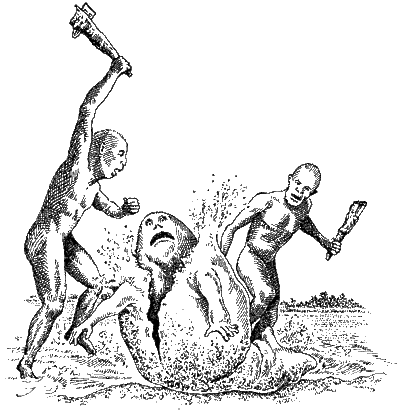
With food in short supply competition between species becomes, literally, a matter of life and death.
A small group of harvesting aquatics (one shall be known as Ghloob) is travelling up a slope, which is not good. Distance from the sea is one thing, but height above its surface is another matter altogether. The aquatics live happily with the pressures experienced in the top layers of the ocean, but they are under considerable strain when exposed to the reduced pressures above the surface. To go any higher would produce all sorts of unwelcome effects in their tissues. An abrupt contour line, above which vegetation grows freely in many parts of the world, marks the limit of aquatic exploitation.
Beyond this contour line live the land people - strange beings who neither understand nor tolerate the aquatics.
There are such land-dwelling beings as the ground-dwellers. Savage and hostile, ground-dwellers feed in the undergrowth and the long-growing vegetation (the very materials that the aquatics harvest). Gangs of them have been known to burst out of hiding and set themselves upon harvesting groups, tearing at their protective membranes with claws and teeth, and sometimes inflicting some damage.
The shapes prove to be trees after all, but the undergrowth beneath them is patchy, curled and dead. Since the area down to the ocean has been devastated by aquatic harvesting and left open to the sky, the air moving off the sea has swept in through the branches and between the trunks, drying up and battering the fragile stems and shrivelling up the leaves. Loose sand and dust from the bare lands has gusted in, suffocating the more delicate types. There is little to be harvested here, but what there is must be taken.
Ghloob and his companions reach out their hands through the membranes and snatch up whatever is growing. Anything that is organic, and contains proteins and carbohydrates, can be used as the basis for food, however tough, however unpalatable. Bundles of leaves, stems, sticks, insects, slugs (anything) are caught up and passed into the sphere of the gathering aquatic. Small punctures in the membranes, like those caused when hands pass through, seal up immediately and there is little or no moisture loss.
Before long the cache within the spherical bubble has become quite large; large enough to take back. The five of them turn to make their laborious way back to their ocean home, glistening welcomingly away on the horizon.
No sooner have they left the shade of the dying trees, and begun their long slow descent, than Ghloob sees something at the periphery of his vision, something moving.
Slowly he turns his head. Ground-dwellers! A whole pack of them! They are running towards the aquatics, waving sticks of some kind. His companions see the danger at the same time, and try to move more quickly. However, their laborious humping motion is not conducive to haste, and anyway they cannot move faster than the spherical bubble containing their harvest - the only reason they are here in this hostile environment in the first place. The ground-dwellers quickly surround them, and as their hazy shapes appear before him Ghloob notices something different about them. They are each carrying something: something like a blade at the end of a stick.
Ghloob has not much time to notice anything else, as he ducks out of the way to avoid them, but after heaving himself along the ground for some distance he turns to look back. The ground-dwellers have all set upon one of his companions. They have plunged their weapons into his membrane and are pulling it apart. With two creatures pulling in different directions this turns out to be very easy, and the membrane collapses in a gush of water leaving the stranded aquatic gasping in the circle of wet mud.
Ghloob and the others crawl frantically away, towards the tempting but distant sea, panic rising within them; with good reason, for the party of ground-dwellers leave the dying aquatic and come running after the straggler of the group and fling themselves upon him. Ghloob does not stay to watch this time, but keeps wriggling.
With every jump and jerk he expects to be attacked from behind, and his membrane torn away from him. The waves of the ocean come closer and closer, but agonizingly slowly. Will he make it before they catch him? He tries not to think about it, and keeps going.
With an intense feeling of joy he feels the pressure of the first wave close around him. He is safe, and at last he can look around. The bubble with one of his companions and the gathered food has reached the sea. The food is also safe, but at what cost? Three companions are lost - punctured, dehydrated and slaughtered on the distant dusty dryness.
The ground-dwellers have never fought like this before. Perhaps the aquatic harvesting has had such an effect on their lifestyle that they have had to adopt these extreme measures to fight back. Maybe the conflict and strife have forced them to find new ways of living and organizing themselves just to survive.
Ghloob's algal envelope dissipates now that he is fully submerged, and with graceful movements he descends the sloping seabed until he is below the push and pull of the waves, and home. Now he has time to ponder. Is this organization and use of weapons by the ground-dwellers to be a feature of all such attacks in the future? Has the aquatics' exploitation of the land made even that more hazardous? Is there nothing that we can do to feed our people without making things worse and worse and worse, and destroying everything that we have? Is this to be the continuing fate of intelligent life above and below the water?
By 3 million years (the 30020th Century)[]
Three million years have passed and the results of constant natural selection and evolution are apparent. The temperate woodland-dwellers have diversified, and developed specialized body forms to fit different environments.
In the temperate regions of the world, where the forests and woodlands still exist on the upland slopes, the hunting temperate woodland-dwellers still pursue their age-old lifestyle, just as they have done since they were engineered. However, as there are so many different food sources in the habitat, many of them have begun to specialize, and to develop bodily forms that are appropriate to their particular way of life. Most lie in wait for birds, or dig in the ground after burrowing mammals. Some even feed on nothing but insects that they remove from the layers of their wooden homes.
Consequently, over the last few million years these omnivores have developed, under the natural influences of selection, to become specialized feeders in the various different environments present.
They have evolved into many forms, including fish-eaters, desert-runners, spiketooths, and antmen.
By 5 million years (the 50020th Century)[]
They become enslaved by the Travelers of the stars and become engineered in a number of different ways to serve the newcomers.
The second phase of biological engineering is exploitation. When applied to a planet this is known as "terraforming". Change and adaptation become secondary to whatever purpose the genetic engineers find important. Earth has not been exploited for 5 million years. When resources are abundant, methods of collecting and refining need not be sophisticated. The function of most of these altered creatures is as simple beasts of burden, able to operate within environments intolerable to their masters.
The atmosphere is being changed. With oxygen no longer present in quantities sufficient to keep Homo sapiens-based species alive, air-tanks and purification systems are essential. Control is by telepathic input direct to the central nervous system.
Years later they die out.
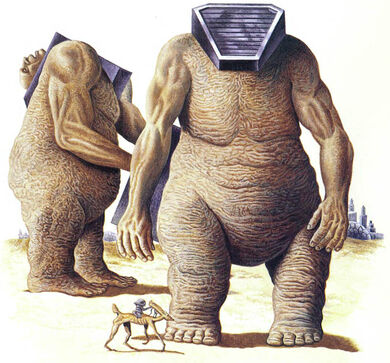
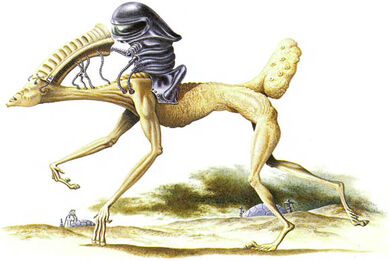
Encased in a pressurized suit, Man's descendant sits astride a creature engineered from the temperate woodland-dweller. Direct telepathic control is exercised over the central nervous system of its mount.
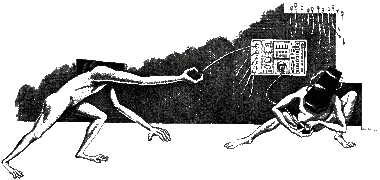
Even smaller forms are developed from temperate woodland-dwellers, to work intricate machinery in confined spaces. They are closest Homo sapiens comes to being a computer-aided soft machine.
